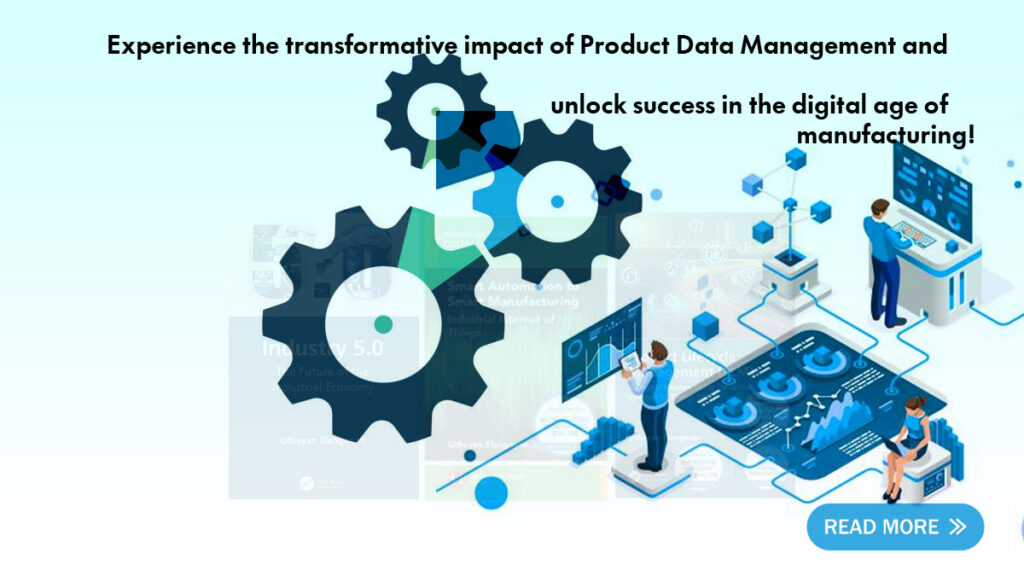Data Empowerment: The Power of Product Data Management

Introduction:
Global manufacturing enterprises face numerous challenges, including complex supply chains, ever-changing customer demands, and intense competition. To navigate these challenges and achieve success, manufacturers across the globe recognize the importance of effective Product Data Management (PDM). In this content, we will delve into the reasons why PDM is crucial for manufacturers and explore its key benefits in driving operational excellence and competitive advantage.
PDM acts as the foundation upon which the entire Product Lifecycle Management (PLM) ecosystem is built, providing manufacturers with a robust framework to optimize their operations, drive innovation, and deliver superior products to the market.
- Streamlined Data Centralization and Accessibility:
One of the primary reasons why manufacturers emphasize PDM is to streamline data centralization and accessibility. As product information grows increasingly complex, maintaining data accuracy, version control, and accessibility becomes critical. PDM provides a centralized repository for managing product data, including design files, engineering specifications, BOMs (Bill of Materials), and related documentation. This ensures that teams have quick and secure access to the most up-to-date information, eliminating the risk of working with outdated or incorrect data.
- Improved Collaboration and Communication:
Effective collaboration and communication between different teams, departments, and external stakeholders are vital for successful manufacturing. PDM systems facilitate seamless collaboration by enabling real-time data sharing, document management, and change tracking. Designers, engineers, and manufacturing teams can work together efficiently, ensuring that everyone is on the same page throughout the product lifecycle. Enhanced collaboration minimizes errors, accelerates decision-making, and fosters cross-functional teamwork, leading to improved productivity and better outcomes.
- Enhanced Version Control and Change Management:
Version control and change management are critical aspects of product development and manufacturing. PDM systems offer robust version control mechanisms, ensuring that every change to product data is tracked, recorded, and auditable. This eliminates the risk of confusion or data discrepancies caused by multiple versions of files. Furthermore, PDM simplifies change management by providing workflows and approval processes for design modifications, ensuring that changes are implemented systematically and in compliance with regulatory requirements.
- Efficient BOM Management:
Managing accurate and up-to-date BOMs is essential for manufacturing success. PDM systems enable efficient BOM management by maintaining a single source of truth for BOM data. This includes managing component information, supplier details, cost data, and lifecycle status. With PDM, manufacturers can ensure that BOMs are accurate, easily accessible, and reflect the latest design changes. This, in turn, enhances supply chain management, procurement activities, and overall production efficiency.
- Regulatory Compliance and Traceability:
Compliance with industry regulations and standards is a significant concern for manufacturers across the globe. PDM systems play a crucial role in ensuring regulatory compliance and traceability. By capturing and managing product data within a controlled environment, manufacturers can demonstrate compliance with quality standards, safety regulations, and customer-specific requirements. PDM also enables traceability by maintaining an auditable record of product data changes, ensuring transparency and accountability throughout the product lifecycle.
- Accelerated Time-to-Market:
In today’s fast-paced market, time-to-market is a critical factor for manufacturers’ success. PDM systems help accelerate product development and shorten time-to-market by enabling concurrent engineering, facilitating collaboration, and streamlining data management processes. With quick and accurate access to product information, teams can make informed decisions, iterate designs faster, and reduce development cycles. This agility allows manufacturers to respond swiftly to market demands, gain a competitive edge, and seize new business opportunities.
- Continuous Improvement and Innovation:
PDM systems provide a foundation for continuous improvement and innovation in manufacturing. By centralizing product data, manufacturers can analyze performance metrics, identify areas for improvement, and drive innovation through data-driven decision-making. PDM systems also facilitate knowledge capture and reuse, enabling organizations to leverage past experiences, best practices, and lessons learned to enhance future product development.
Conclusion:
Product Data Management (PDM) plays a pivotal role in the success of manufacturers across the globe. By streamlining data centralization, improving collaboration, ensuring accurate BOM management, and enabling regulatory compliance, PDM empowers manufacturers to drive operational excellence and gain a competitive advantage. The benefits of PDM extend beyond streamlined processes and enhanced productivity to accelerated time-to-market, continuous improvement, and innovation. Manufacturers who embrace PDM as a strategic initiative position themselves for success in an increasingly dynamic and challenging manufacturing landscape.
Want to dive deeper into the world of PLM and IIoT? Look no further! Check out the insightful book on PLM with IIoT by Neel SMARTEC. Gain valuable knowledge and discover how this powerful combination can transform your manufacturing operations. From enhanced connectivity to improved efficiency, this book covers it all. Don’t miss out on this opportunity to level up your business.
Attention small to medium manufacturers! Are you ready to revolutionize your product data management? Discover the power of OpenBOM PLM and unlock seamless collaboration, streamlined processes, and enhanced productivity. Contact our PLM Consulting Services today for expert guidance and a smooth onboarding experience. Take the first step towards transforming your manufacturing operations and gaining a competitive edge in the market.


